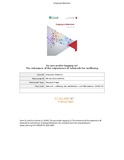Mostrar el registro sencillo del ítem
Do you prefer logging in?: the relevance of the experience of telework for wellbeing
| dc.creator | Urien Angulo, Begoña | es_ES |
| dc.creator | Erro Garcés, Amaya | es_ES |
| dc.date.accessioned | 2024-03-06T14:13:33Z | |
| dc.date.available | 2024-03-06T14:13:33Z | |
| dc.date.issued | 2024 | |
| dc.identifier.citation | Urien, B., Erro-Garcés, A. (2024) Do you prefer logging in? The relevance of the experience of telework for wellbeing. Employee Relations, 1-16. https://doi.org/10.1108/ER-10-2022-0487. | en |
| dc.identifier.issn | 0142-5455 | |
| dc.identifier.uri | https://hdl.handle.net/2454/47652 | |
| dc.description.abstract | Purpose –The swift and unanticipated integration of telework by European companies due to COVID-19 gave rise to distinct features of telework. These attributes underscore the necessity of analysing its impact on employees’ well-being. This paper explores how telework experiences impact well-being by influencing work– life balance and job satisfaction. Additionally, it investigates whether employee preferences for telework are a contributing factor. Design/methodology/approach – Based on the data provided by the “living, working and COVID-19” e-survey, structural equation models (SEM) were used to test the hypotheses. Specifically, a multiple-mediation approach and path analyses were applied to measure the relationship between the variables under study. The moderating role of preference for telework was also tested. Findings – Key findings support that telework experience has a positive impact on well-being, both directly and indirectly, particularly via work–life balance. Although preference for telework strengthens the relationship between telework experience and well-being, it does not enhance the predictive power of the mediated model. Practical implications – These results have important implications from an applied perspective. Human capital departments as well as managers should design telework programmes to create a positive experience since this will ensure a positive influence on the perception of work–life balance, job satisfaction and well-being. Originality/value – COVID-19 as a sudden environmental constraint forced the implementation of telework without proper planning and training. Thus, how the employees experience this major change in their working conditions has affected their well-being. The present paper contributes to clarifying how the proposed variables relate under such constraints. | en |
| dc.format.mimetype | application/pdf | en |
| dc.language.iso | eng | en |
| dc.publisher | Emerald | en |
| dc.relation.ispartof | Employee Relations, 2024, 46, 1-16 | en |
| dc.rights | © Emerald Publishing Limited. | en |
| dc.subject | Well-being | en |
| dc.subject | Job satisfaction | en |
| dc.subject | Work–life balance | en |
| dc.subject | Telework | en |
| dc.subject | COVID-19 | en |
| dc.title | Do you prefer logging in?: the relevance of the experience of telework for wellbeing | en |
| dc.type | Artículo / Artikulua | es |
| dc.type | info:eu-repo/semantics/article | en |
| dc.date.updated | 2024-03-06T13:47:04Z | |
| dc.contributor.department | Gestión de Empresas | es_ES |
| dc.contributor.department | Enpresen Kudeaketa | eu |
| dc.contributor.department | Institute for Advanced Research in Business and Economics - INARBE | en |
| dc.rights.accessRights | Acceso abierto / Sarbide irekia | es |
| dc.rights.accessRights | info:eu-repo/semantics/openAccess | en |
| dc.identifier.doi | 10.1108/ER-10-2022-0487 | |
| dc.relation.publisherversion | https://doi.org/10.1108/ER-10-2022-0487 | |
| dc.type.version | Versión aceptada / Onetsi den bertsioa | es |
| dc.type.version | info:eu-repo/semantics/acceptedVersion | en |


